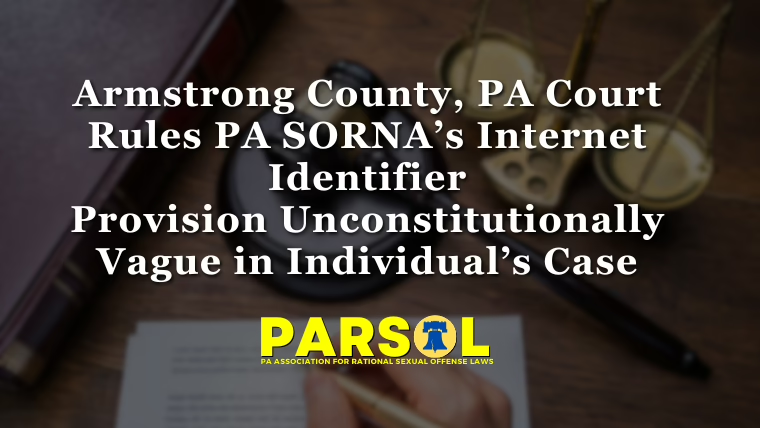A History of PA’s Megan’s Law and a the federal Sex Offender Registration and Notification Act (SORNA).
In the United States, we take it for granted that there is a public list of people that society has deemed are dangerous degenerates who do not deserve the full protection of the law.
Anyone with a passing interest can browse a website and learn intimate details of people who have, at some point in their lives, committed a sexual offense.
In Pennsylvania, the information that you will find on the public sex offense registry includes
- Full name and address
- Physical description including tattoos and scars
- Car make, model, and license plate number
- Zip Code of their employer
- Address of what school they attend
- Details of the crime that they were convicted of
- Photographs
As Dr. Eric Janus of the Mitchell Hamline School of Law points out, we have set a dangerous precedent for constitutional rights that he compares to the internment of Japanese citizens during the Second World War. Despite having served their sentences, people on sex offender registries in PA have to deal with travel restrictions, public shame, and an existence as second-class citizens for at least ten years and up to their entire lives.
How did we get here?
Public sex offender registries as we know them might be traced back to legislation enacted in the wake of the 1989 abduction of 11-year-old Jacob Wetterling. The US Congress passed the Jacob Wetterling Crimes Against Children and Sexually Violent Offender Registration Act in 1994 which mandated states to create a registry of persons who have committed sexually violent offenses or crimes against children.
Following the heinous 1994 rape and murder of a young New Jersey child, the Wetterling Act was amended in 1996 to require public dissemination of the newly formed registries. As the perpetrator in this incident was a male neighbor who had a history of sexual offenses against children, it was reasoned that access to the information in public registries would allow parents and guardians to ensure the safety of children. This amendment was known as Megan’s Law and was seen as a way to prevent such a nightmare from happening to any more families.
In 1995, PA Governor Tom Ridge convened a Special Session of the General Assembly (the PA House and Senate) focused on the issue of crime. Two of the results from this effort were the creation of the Office of Victim Advocate and the creation of a Megan’s Law in PA.
According to Act 24 of Special Session 1 in 1995, an amendment to the PA Judicial Code, this new law was created under the General Assembly’s findings that:
- Public safety would be enhanced by the public’s knowledge of the presence of people convicted of sexual offenses in their communities
- People convicted of sexual offenses pose a high risk of re-offending
- The public is better served by more transparency in the ways that the judicial system applies to people convicted of sexual offenses
- Current laws on confidentiality have chilled the release of information about people convicted of sexual offenses that could increase public safety
- People convicted of sexual offenses “have a reduced expectation of privacy because of the public’s interest in public safety and in the effective operation of government”.
- Release of information about people convicted of sexual offenses to the general public “will further the governmental interests of public safety”.
This new law, which took effect in April 1996, applied to a limited range of offenses which included felonies involving minor victims and sexual assault crimes involving a victim of any age. All of these crimes were defined as “sexually violent crimes”.
A conviction of any of these crimes required an evaluation by the State Board to Assess Sexually Violent Predators. The Board would submit a report to the Court before sentencing and a judge would then determine whether or not the defendant would be labeled as a Sexually Violent Predator (SVP).
Registration for those not labeled as an SVP was limited to ten years. For those designated SVPs, registration would continue up until the time that the former offender could successfully petition the Court and receive a new evaluation. If the Court granted this motion and if The Board determined that they no longer met the criteria for designation as an SVP, the former offender would be free of this label. This process could be undertaken once every 5 years.
Under this 1995 law, failure to register was deemed a 3rd degree felony (a 3rd degree felony is less severe than a 2nd or 1st). Verification of residence was completed via a mail-in form and was required either annually or quarterly (for those designated SVPs).
Finally, for those labeled SVPs, this bill required the police to provide written notice of the former offender’s address and crime to neighbors and directors of schools and childcare centers located near the former offender’s residence. At-will access to information on the registry was not yet available on the internet for the public to browse. The information on the registry was available by request only.
This law, which we now consider “Megan’s Law 1” was struck down in the case of Com. v. Donald Williams, 733 A.2d 593 ([Pa.] 1999) (Williams I). The Supreme Court of PA found the presumption of being a SVP and bearing the burden of rebutting such a presumption by clear and convincing evidence cannot fall on the former offender. That is, it was not the duty of the former offender to prove that he was no longer a threat. Rather, to deny liberty and impose extra conditions on a person, the state must argue that the former offender is a risk to public safety.
This would not be the last time that the Commonwealth’s attempts at implementing a public sex offense registry resulted in a state Supreme Court decision. Stay tuned for Part 2 of this series as we trace the history that leads us to the Torsilieri decision coming later this year.
Reference:
https://www.pameganslaw.state.pa.us/InformationalPages/History
https://www.mcall.com/news/mc-xpm-1995-01-24-3024484-story.html
https://www.legis.state.pa.us/WU01/LI/LI/US/PDF/1995/1/0024..PDF



![stuckIn1995_rally_header - PARSOL - Pennsylvania Assoc for Rational Sex Offense Laws (PA Megan's Law Resources) PARSOL Board Chair Josiah Krammes speaks at the PA Capitol Rotunda flanked by State Reps. Emily Kinkead and Tim Briggs (28 Oct 2025) [John Dawe/PARSOL]](https://parsol.org/wp-content/uploads/2025/10/stuckIn1995_rally_header.avif)